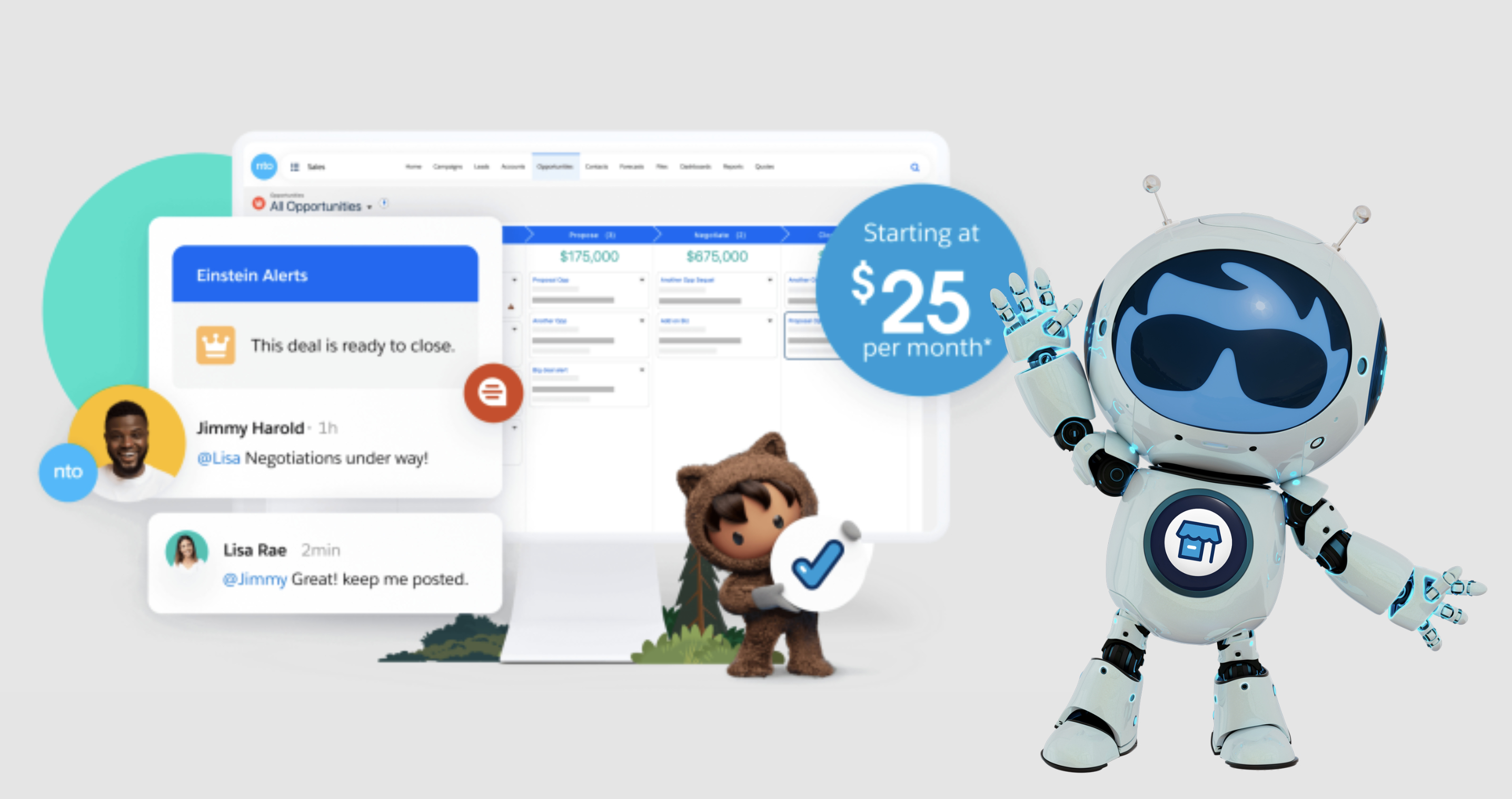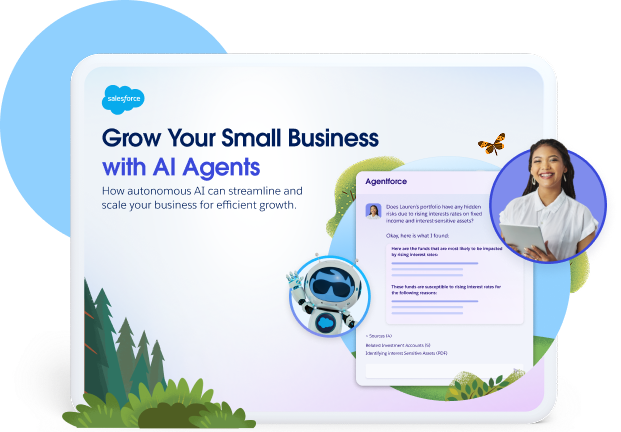AI For Startups: 9 Use Cases For Growing Businesses

AI can help your startup succeed by streamlining tasks, improving customer experiences, and making data-driven decisions — find out how.
Starting a business itself is challenging. You’re up against larger companies, tight budgets, and a crowded market. However, artificial intelligence (AI) can help you overcome these challenges. As per the Small & Medium Business Trends Report (6th Edition), 90% of small to medium-sized business (SMB) and startups utilize AI to automate customer interactions, showing just how essential AI has become for driving customer engagement. With AI, you’re paving the way for a smarter, more connected future.
Here are 9 AI use cases for startups that help you achieve your goals, while improving customer satisfaction, team productivity, and growth.
What we’ll cover:
- AI in sales: Build stronger customer relationships
- AI in customer service: Automate support to boost satisfaction
- AI for marketing: Reach the right audience with targeted campaigns
- AI in operations: Save time and cut costs
- AI in finance: Budget smarter and boost security
- AI in HR: Make hiring easier and boost employee satisfaction
- AI in security: Keep your data and customers safe
- AI in product development: Stay ahead of market trends
- AI in data analysis: Turn insights into action
1. AI in sales: Build stronger customer relationships
AI transforms how startups handle sales, from forecasting to relationship-building. Among AI use cases for startups, sales applications allow teams to build stronger customer connections and predict future needs.
Sales forecasting with AI
AI tools can study past sales data to see trends and predict busy or slow periods. With this information, you can plan better and allocate resources effectively.
- Streamline resource allocation with AI insights.
- Make smarter decisions through clear forecasting.
Sales teams can leverage AI-powered customer relationship management (CRM) like Salesforce to boost efficiency. With tools like Agentforce, your sales team can gain a deeper understanding of customer needs and deliver more relevant recommendations, creating meaningful connections that drive sales. For example, Crexi saved sales reps 5 hours a day by automating lead tracking and allowing reps to focus more on customer relationships.
Improving customer relationships with AI
AI-powered CRM tools store and analyze customer data so you can offer relevant deals and communication. Tasks like data entry are automated, saving your team time.
- Personalize messaging to make customers feel valued.
- Save time by automating tasks and focusing on relationships.
AI Tools for Small Business
2. AI in customer service: Automate support to boost satisfaction
Great customer service can set your startup apart. With AI, you can speed up response times and ensure each customer receives the support they need. This is one of the most widely adopted AI use cases for startups and SMBs, as it enables efficient and scalable customer service.
AI-powered support
AI tools like chatbots and virtual assistants allow you to provide support 24/7. They can answer common questions, solve simple issues, and send complex ones to human agents through collaborative tools like Small Business Slack, creating a smoother experience for customers. In fact, 87% of small business teams use AI to personalize the customer journey across channels, helping enhance customer satisfaction and resolve identity issues.
- Get 24/7 customer support with an AI agent and help customers any time.
- Resolve customer issues faster with automating routine questions, reducing wait time.
AI tools like Salesforce Service have helped companies like Algo reduce service call times by 80%, significantly improving efficiency and customer satisfaction.
Reading customer sentiment with AI
AI can analyze feedback from surveys, social media, and customer service interactions to understand customer sentiments better. This helps you fix issues before they grow, keeping customers happy and loyal.
- Build customer loyalty by resolving issues quickly to foster trust.
- Improve product quality by using customer insights to better meet needs.
3. AI in marketing: Reach the right audience with targeted campaigns
AI marketing tools give you insights into your audience, allowing you to create more targeted campaigns that drive higher engagement. AI use cases for startups in marketing are among the most popular due to their ability to increase customer engagement and conversion rates.
Personalized campaigns for higher engagement
With AI, you can use customer data to send highly personalized messages, increasing engagement. With this approach, you’ll see a better return on investment (ROI) and have the flexibility to make real-time adjustments as you track your campaign’s progress. Around 82% of small business marketing teams also leverage AI to offer real-time deals, ensuring customers receive relevant offers when they’re most interested.
- Achieve higher ROI with targeted campaigns that drive more conversions.
- Make real-time adjustments as AI tracks and fine-tunes your messaging.
For example, Ennube increased the number of prospect emails sent by 5,600%, thanks to AI-powered tools that helped them scale their outreach and personalize communication.
Predicting trends with AI
AI-powered predictive tools help you spot trends and prepare for customer needs. From product recommendations to ad adjustments, AI lets you stay ahead of the curve.
- Reduce risk by avoiding overstocking or shortages with trend forecasting.
- Stay adaptable by quickly adjusting to meet changing customer needs.

4. AI in operations: Save time and cut costs
With AI and solutions like digital storefronts, you can reduce operational hurdles, managing orders and inventory more effectively while cutting down on costs.
Automate routine tasks
AI can handle repetitive tasks like data entry, invoicing, and team workflows. This reduces human errors and lets your team focus on more important work. 88% of SMBs use AI for data integration and process automation, helping reduce repetitive work and improve efficiency.
- Reduce costs with automation for repetitive tasks.
- Ensure clean data with fewer errors for reliable insights.
Optimize store performance with AI
AI can track your storefront performance so you can be more informed and make better decisions:
- Use your data to build valuable insights about purchases and transactions.
- Reduce issues by using AI to predict problems for proactive action.
5. AI in finance: Budget smarter and boost security
AI-driven finance tools help startups budget, forecast, and detect fraud. Financial management is a critical AI use case for startups as it enhances budgeting accuracy and security.
Accurate budgeting and forecasting
AI tools can predict revenue, expenses, and cash flow, allowing you to create budgets that support growth while minimizing risk.
- Create smarter budgets with reliable forecasts
- Drive growth decisions using valuable financial insights.
Real-time fraud detection
Data intelligence scans transactions to spot suspicious activity, adding an extra layer of security to protect your business.
- Receive instant alerts for irregular transactions
- Strengthen customer trust with reliable fraud detection
Get started with AI for your startup today
Salesforce Starter will help you understand how to use AI to maximize your startup growth.



6. AI in Human Resources: Easy hiring and boosting employee satisfaction
For human resources, AI tools can improve recruitment and boost engagement, both of which contribute to a positive work environment. HR-related AI use cases for startups make the hiring process faster and more inclusive.
Simplifying hiring with AI
Make hiring easy by using AI agents to review resumes to find candidates with the right skills, speeding up hiring and reducing bias.
- Build inclusivity through skills-focused hiring.
- Shorten the hiring process with automation.
Increasing employee engagement
Boost your team morale with AI-backed analysis. AI analyzes employee feedback to measure satisfaction, giving you insights to make a better team environment.
- Reduce turnover by increasing employee satisfaction.
- Enhance support through actionable insights for your team.
7. AI in security: Keep your data and customers safe
Startups often handle sensitive information, making cybersecurity essential. AI-driven cybersecurity is one of the most crucial AI use cases for startups, offering proactive threat detection.
Spotting cyber threats
With AI monitoring network activity and user behavior, you can detect unusual patterns and prevent breaches before they happen, strengthening your business’s security.
- Monitor network security 24/7 with AI.
- Flag unusual patterns instantly with quick alerts.
Securing access
Stay secure with AI that controls who has access to data, making sure only authorized users can view sensitive information.
- Prevent breaches with controlled access to avoid unauthorized data use.
- Increase efficiency through automated access management to save time and reduce errors.
8. AI in product development: Stay ahead of market trends
AI assists in product development by spotting customer needs and market trends, helping you create products that customers want. Product development is an innovative AI use case for startups, enabling them to stay competitive.
Identify trends
Spot patterns with AI that can analyze data to reveal customer preferences and trends, helping you create products that meet demand.
- Match customer needs with trend insights to create desired products.
- Find opportunities by analyzing trends to identify market gaps.
Optimize features based on feedback
AI can scan customer feedback to prioritize features, helping you develop products faster and more effectively.
- Streamline development with data-based choices to speed up timelines.
- Enhance customer satisfaction by prioritizing popular features to keep customers happy.
State of the AI Connected Customer
Insights from 16,000+ consumers and business buyers worldwide on bridging the trust gap in an era of rising customer expectations and more powerful technologies.


9. AI in data analysis: Turn insights into action
Data analysis is a core AI use case for startups, allowing them to analyze large datasets, uncover patterns, and support data-driven decision-making.
Business intelligence and reporting
With an AI-powered solution like Data Cloud, you can analyze your data to generate meaningful reports, which help to quickly identify opportunities and challenges — helping you stay competitive.
- Turn data into clear, strategic reports for actionable insights.
- Make informed decisions faster with AI.
Predictive analytics for various business functions
Predictive AI uses historical data to predict future outcomes, from customer behavior to sales performance. This helps startups make proactive, data-backed decisions.
- Anticipate trends and challenges to reduce uncertainty.
- Enhance forecasting accuracy for greater confidence.
Data visualization and dashboards
AI-powered dashboards present data in a visually appealing and easy-to-understand format, making it easier to communicate findings and track key metrics in real-time.
- Track data in real time with visual dashboards that update instantly.
- Simplify data presentation for easier accessibility and understanding.
Final thoughts on AI use cases for startups
Your startup is ready to be powered by AI. By exploring AI use cases for startups and SMBs with tools like Salesforce’s Starter Suite, SMB Commerce storefront, and Agentforce, you’re setting up for a smarter, more connected future. This blog has shown how AI can make a difference in areas like sales, marketing, customer service, operations, security, finance, and HR.
Start your journey with the Starter Suite today. Looking for more customization? Explore Pro Suite. Already a Salesforce customer? Activate Foundations and try out Agentforce today.
AI supported the writers and editors who created this article.





























